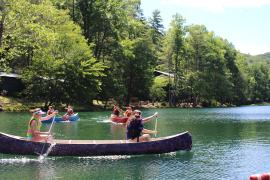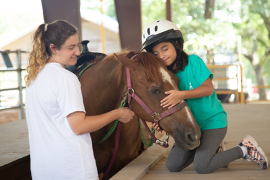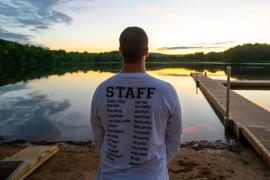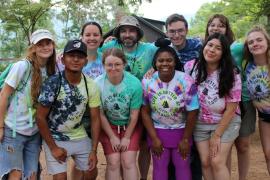Did you get past the title? If you did, stick with me. I’ll start with the end.
Now is the time to start imagining your 2024 camp staff roster. The reality of the situation is that your staff are already thinking about next summer’s plans right now. Some staff must complete an internship during their college time, while other staff have a bucket list of experiences they wish to acquire before that anticipated milestone of graduation and stepping into the full role of adulting.
Is your camp on their bucket list or a place they wish to return? Chances are high that you have already identified the star, rising star, or potential rising star staff members at your camp this summer. Are they aware of this stature in your mind? They should — and let me share some current research suggesting the benefit of letting those staff members know about your vision and their potential for growth at your camp. Let’s make sure your camp is one of their top options on the bucket or experience list to consider for 2024.
Evidence to Consider
In the fall of 2022, data (n = 576) were gathered from students at two universities (Owens & Mulvaney, 2023). When asked about their 2022 summer employment, 43 percent of respondents indicated that they returned to a job previously held. Furthermore, 26 percent of survey respondents learned of their 2022 job opportunity from either previous work or experience with the organization they ultimately selected to work at that summer. What does this suggest? Your current staff are already assessing their options as we speak.
Staff’s Summer Options
Hiring and retention are tough ventures in today’s market given that plentiful opportunities exist for job seekers. University students have other options too. Some students have the means to not work at all, but to explore the world during the summer. Other students already work full-time or multiple part-time jobs during the school year that transition into the summer. Remember: college costs are reaching record levels. A few students embark on internships or seek to gather a variety of experiences through work, volunteer, or experiential learning opportunities to support both their personal and professional growth. Where does your camp sit in this range of opportunities and how can your camp be one of these options for your current staff moving forward? To answer that question, look within your staff.
Path to Being an Option
The pathway described here can be adjusted to match your camp’s structure and timeline.
1. Conduct an internal staff assessment midway through the summer season
Gather your leadership team and assess your staff on three factors: (a) quality of work, (b) quality of peer engagement, and (c) quality of camper engagement. A simple scale of high quality, average quality, and low quality is sufficient for this assessment. The staff that rank high in each of these areas should be given additional consideration and evaluation in the next step.
2. Evaluate potential of high-quality staff members
After you’ve recognized these individuals, identify the specific qualities leading you to this assessment. This is the step where specific examples enable your team to identify individuals ready for promotion to higher responsibilities or quality staff with the potential for growth given an opportunity to return for another season.
3. Meet with identified staff members during last session
While recognizing the potential pitfalls or politics behind sharing a welcome to return, a welcome to reapply or it’s time to move on to another opportunity message, these messages need to be delivered before staff leave for the season to enable them to plan for their future. When meeting with staff whom you want to return, try using this script:
- “I’d like to learn more about your goals for the coming year,” then move onto
- “I believe our camp can support your goals and let me tell you how I see that happening,” and lastly
- “We would like you to return next summer and this is what we envision for that experience”
Now pause and ask this important question: “Is this something you could envision doing next summer? What might be some barriers or challenges that we would need to address?”
While most staff are thinking about future opportunities, be prepared for their pause as they contemplate your message. Not everyone envisions multiple summers of the same job, let alone working at a summer camp again. If needed, give them time to process the idea and return to the conversation before they depart for the summer.
4. Communicate timeframe
Time and space can be beneficial for various situations involving mental processing. Yes, it’s helpful to lock ‘em in early, but what if a truly better opportunity or an unexpected situation occurs when they return to school such as a scholarship for a study abroad experience or a family dynamic change that is outside their control. When those situations happen, that staff person needs to navigate the process of letting you down and choosing the right thing to do. Instead, give the staff person a time frame for when you will follow up in early fall.
5. Follow up in early fall
Contact them in October to see if any changes arose and what they are contemplating. Give them a deadline for their decision. For example, a December 1 deadline would allow the staff person to return home to friends and/or family at Thanksgiving and discuss their employment options. The study referenced earlier, showed that 28 percent of respondents found their friends and family to be the most informative resources when making summer employment plans. After the deadline passes, if they chose not to return, but change their mind, the staff person is welcome to reapply.
New Era of Staff Recruitment and Retention
The above pathway can be adapted for campers aging out of CIT/LIT/JC programs. Be sure to include a direct conversation with those campers’ parents during step 3 to ensure they clearly understand the opportunity. Camps everywhere are adapting and identifying new methods to engage a smaller and more scrupulous workforce. Let’s take a page from their workbook, and assess early to get on their list of summer options.
End of Summer Staff Conversations
As the end of camp season approaches, we also come to the time for exit interviews and staff meetings. These meetings are prime opportunities for recruiting your next season’s staff and helping all your staff identify and work toward their goals whether it is at your camp or elsewhere. These personal staff meetings can be nerve-wracking when we are concerned that staff will share the conversation details with each other and realize not everyone will be asked to return next summer. From a youth and adult development perspective, we have the unique opportunity to help people grow, otherwise we wouldn’t be in the summer camp business. To reduce the worry and chance for negative post-conversation sharing, let’s take an approach that is fully focused on staff member’s goals.
Goal-Focused Exit Conversations
Every exit conversation with staff members, regardless of their retention potential, should be centered around that individual’s career and personal goals. By focusing on the staff member’s goals, you are placing their needs and interests at the center of future decisions. This focus shows that you care about them and their life progress, and allows you to provide relevant, specific suggestions for them. This conversation can happen in 10 minutes or it could be an hour, it depends on how much time you wish to spend with each person. Be consistent though to avoid views of favoritism.
Here is a conversation template to keep the conversation flowing, timely, and focused on the goals.
Camp: One thing we are trying to do this summer is make sure we have a good understanding of our staff member’s career and personal goals. Sometimes we can support those goals at camp and other times we can’t, so we’ll suggest different opportunities or options that someone may not have considered before. What are some of the career goals that you’re considering right now as you go back to school?
- Listen with intention, then respond.
Camp: Those are really interesting goals. Have you thought about where those could be addressed or achieved?
- Listen with intention, then respond.
Camp:
- (Staff you want to return) Have you ever considered this camp as an option for those goals?
- (Staff who could reapply) You might consider reapplying here, and in the mean time I’d like to suggest a few ways you could further enhance your skills during the school year.
- (Staff you do not want to return) I’m hearing that you’re interested in “x” experience. Unfortunately, we’re not the best place for that experience, but I’d like to suggest another option for you to consider or look into.
- Make a specific suggestion about either gaining other experience during the school year, applying for other types of jobs, or resources that will help them learn more about their area of interest.
- Watch for physical reaction to the suggestion, then proceed
Camp: Have you ever considered that idea before?
Be Honest, Not Brutal
The last scenario (not wanting to retain a staff member) can be the toughest, but we shouldn’t avoid it. Even the staff that are difficult to work with deserve the opportunity to improve. Also, sometimes staff have outgrown their camp and need to go elsewhere to continue growing and learning.
Staff in this early phase of Gen Z are seeking authenticity. When your camp is not the right fit, be honest about it, but focus on their goals and skill growth rather than their personality. Even if they want to return, but your camp is not the place where they will grow or succeed, it is better to provide suggestions to help them move along in a new direction than to leave them wondering.
Say this:
It seems like this camp may not have been the best setting for your skill set or interests. Let’s consider some other options that better match your goals. — Honest and authentic
Not this:
This camp wasn’t the right fit for you. — Vague and open to wild interpretation
Most staff, just like campers, do not set out to be the most difficult person anyone has ever worked with. Behaviors may be misguided, personality might be a mismatch, or skills could require further maturing. Honest conversations with actual suggestions support their growth.
Welcome, Not Welcome
Hard choices come in life and everyone is not always selected for every opportunity. When suggesting alternative opportunities to the non-retained staff members, their reaction may be one of defeat, defiance, or disgust. Regardless of reaction, remind them of their gained experience from this camp job and focus on their next goal, which will be better addressed elsewhere. At the end of the day, stating that “you care about them” and “you want to support their growth” can go a long way. You might not get this response immediately, but with a little time and space, they come around to realize the personalized insight you shared with them. For those staff member’s you wish to retain, they now have the knowledge about your camp’s interest and willingness to be the place where they can grow and enhance their skills next season. Let’s end the season with goals in mind to get an even better start to 2024.
References
Owens, M.H. & Mulvaney, M. (2022). Examining Gen Z, Emerging Adult Summer Employment Priorities. American Camp Association National Conference Research Symposium. Orlando, FL.
Megan Owens, PhD, is an associate professor in the Department of Recreation, Park, Tourism, and Hospitality at Western Illinois University. Her multiple camp positions have informed her current
role of educator and mentor to young adults preparing to enter the youth development field. Megan's
research focuses on the development and facilitation of youth social-emotional learning skills through out of school time programs with a particular emphasis on the youth-adult relationship and camp counselor preparation in summer camps.
Photo courtesy of Camp Kiwanis / Boys & Girls Club of Metro Atlanta
The views and opinions expressed by contributors are their own and do not necessarily reflect the views of the American Camp Association or ACA employees.




